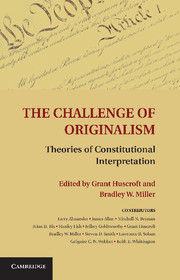Book contents
- Frontmatter
- Contents
- Preface
- Contributors
- The Challenge of Originalism: Theories of Constitutional Interpretation
- Part One Exposition and Defense
- Part Two Interpretation and Intention
- Part Three Originalism and Constitutional Settlement
- 7 Originalism’s Constitution
- 8 The Curious Concept of the “Living Tree” (or Non-Locked-In) Constitution
- 9 Vagueness, Finiteness, and the Limits of Interpretation and Construction
- Part Four Challenges and Critiques
- Index
- References
7 - Originalism’s Constitution
from Part Three - Originalism and Constitutional Settlement
Published online by Cambridge University Press: 07 October 2011
- Frontmatter
- Contents
- Preface
- Contributors
- The Challenge of Originalism: Theories of Constitutional Interpretation
- Part One Exposition and Defense
- Part Two Interpretation and Intention
- Part Three Originalism and Constitutional Settlement
- 7 Originalism’s Constitution
- 8 The Curious Concept of the “Living Tree” (or Non-Locked-In) Constitution
- 9 Vagueness, Finiteness, and the Limits of Interpretation and Construction
- Part Four Challenges and Critiques
- Index
- References
Summary
Introduction
What is originalism? Given the breadth and depth of scholarship on the matter, the question may suffer from an embarrassment of different answers. One might appeal to the “old originalism” with its focus on the intentions of the founders or the “new originalism” with its focus on the public meaning at the founding; in turn, one might review the range of originalisms that animate constitutional scholarship since the turn to new originalism. Proceeding in this way would reveal that the answer to our question is not obvious or, rather more accurately, any single answer purporting to identify a single account of originalism would likely be contestable. The contest would be raised not only within the family of originalists, but also over who may be admitted therein, as not all self-proclaimed originalists are recognized by others to be members of the same set. But proceeding with this genre of answer would already assume a prior answer to our question. For before one seeks to identify the commands and commitments of originalism, one must situate originalism within the world of constitutional theory, namely as a theory of interpretation.
Originalism, of course, is usually situated alongside other theories of constitutional interpretation. In the United States, it is contrasted with living constitutionalism or, in rather less descriptive and more encompassing terms, with “non-originalism.” At other times or in other jurisdictions, competing theories of interpretation may include textualism or intratextualism, purposive or progressive interpretation, moral principles, representation-reinforcing interpretation, structural or unwritten constitutional principles, and living-tree constitutionalism, to name but a few. Much of the debate surrounding originalism has focused on its inherent and comparative merits as a theory of interpretation. Reasons supporting originalism have been first-order (inherent to originalism's methodology) and second-order (comparative to other interpretive approaches and instrumental to pursuing good ends), as well as directed to what the task of interpretation must of necessity be and what it should be. These debates have contributed in important ways to our understanding of originalism. But just as the focus on originalism as a theory of interpretation has assisted in focusing attention on specific commitments of originalism, it has also privileged one vantage point over others, perhaps keeping from view other related commitments. How might these be brought to light?
- Type
- Chapter
- Information
- The Challenge of OriginalismTheories of Constitutional Interpretation, pp. 147 - 178Publisher: Cambridge University PressPrint publication year: 2011
References
- 1
- Cited by



